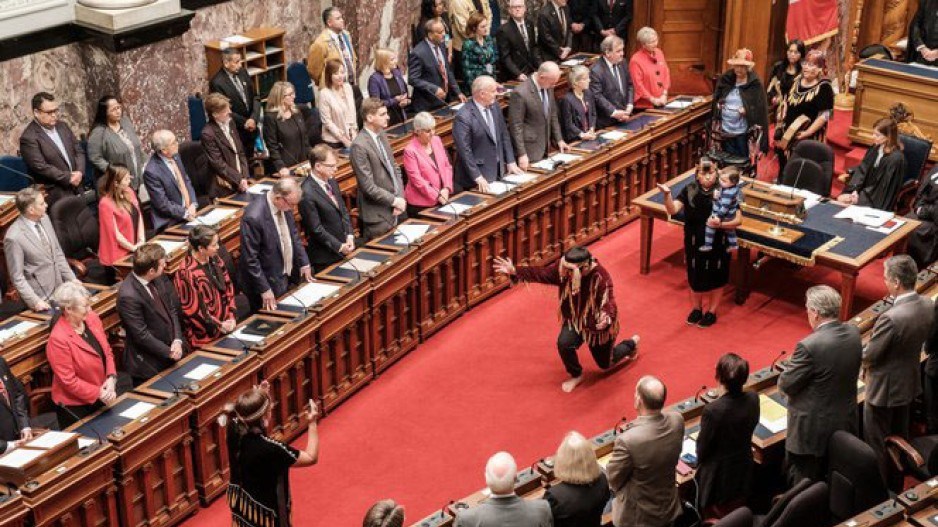The B.C. government today announced an action plan for implementing the Declaration on the Rights of Indigenous People Act (DRIPA) that includes reforming legislation and regulations for forestry and mineral exploration, and opens the possibility of towns and cities in B.C. changing their names.
DRIPA was passed in 2019. It requires the B.C. government to harmonize existing laws and regulations to conform with the declaration, which acknowledges indigenous rights, including the right to self-governance.
Today, the government announced a five-year action plan for its implementation that includes 89 articles and actions and which was co-developed with indigenous people.
A number of First Nations groups on hand for the plan’s announcement praised the John Horgan government for its commitment to reconciliation with indigenous people through the plan.
“To me the action plan really is about the meat on the bones,” said Cheryl Casimer, political executive for the First Nations Summit, just one of several First Nations groups on hand for the plan’s announcement Tuesday.
She noted that each action has a ministry attached to it so that people know who is responsible for implementing the required legislative changes.
“This action plan represents an important advancement towards reconciliation between B.C. First Nations and the Government of British Columbia,” said Rosalie Yazzie, vice-chairperson and director for the BC First Nations Justice Council.
The plan makes some key distinctions when it comes to the rights of certain indigenous groups. One of those distinctions is First Nations that have signed modern-day treaties.
“The province’s relationship with the eight Nations with whom it has signed modern treaties is distinct and unique,” the implementation act states.
“These treaties, to which the government of Canada is also a signatory, set out constitutionally protected rights and obligations of the parties and contain the actions and language necessary to carry out those rights and obligations. The rights and obligations contained in modern treaties have been established, a distinction that has significant and important implications for the work the Province does with modern treaty nations.”
The act also makes distinctions between First Nations, Metis and Inuit.
“This requires that the province’s dealings with First Nations, Métis and Inuit Peoples be conducted in a manner that acknowledges the specific rights, interests, priorities and concerns of each, while respecting and acknowledging these distinct peoples with unique cultures, histories, rights, laws, and governments,” the action plan states.
The action plan has implications for resource industries, especially forestry and mining, as it includes reform legislation for the Forestry Act and Mineral Tenure Act.
The Association of Mineral Exploration (AME) says it supports rewriting the Mineral Tenure Act.
“AME supports the B.C. government’s Declaration Act Action Plan and is committed to actively working with the province to help advance its commitment to modernize the Mineral Tenure Act in consultation and collaboration with First Nations and First Nations organizations," the AME said in a press release.
Questions over indigenous rights and title are particularly pronounced in B.C., since treaty making with First Nations by colonial and Canadian governments largely stopped at the B.C. government. That has led to a lot of uncertainty on the land base, and has spawned numerous legal battles and attempts to address the uncertainty through modern treaties.
Premier John Horgan said DRIPA won’t necessarily put an end to legal wrangling, but said the government has an obligation to do what it can to address indigenous rights and work towards reconciliation.
“We will have disagreements going forward – make no mistake,” Horgan said. “But that doesn’t take away from our mutual commitment to each other to make sure that we do everything we can, our level best, to make British Columbia a better place for the children indigenous and non-indigenous.”
One disagreement currently in the courts is a title claim made by Nuchatlaht over Nootka Island, which includes a provincial park – a claim the B.C. government is contesting.
Asked how he squared that current dispute with DRIPA , Horgan pointed out that, in the case of the Blueberry River treaty infringement case, the province chose not to appeal a BC Supreme Court ruling that found the province had breached the nation’s Treaty 8 rights.
“The province would have, in traditional times, appealed that as a matter of course,” he said. “We chose to not do that and instead sit down and negotiate. The case of the Nuchatlaht territory…is one that, unfortunately, couldn’t get resolved without it ending up in a court room."
Among the numerous articles in the DRIPA action plan is a mechanism that would allow municipalities to change their names from colonial to indigenous names. Whether there is a rash of name changes for towns and cities in B.C. as a consequence will be up to municipal governments, Horgan said.




